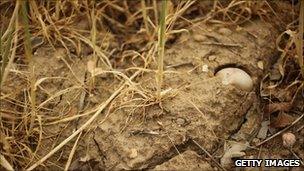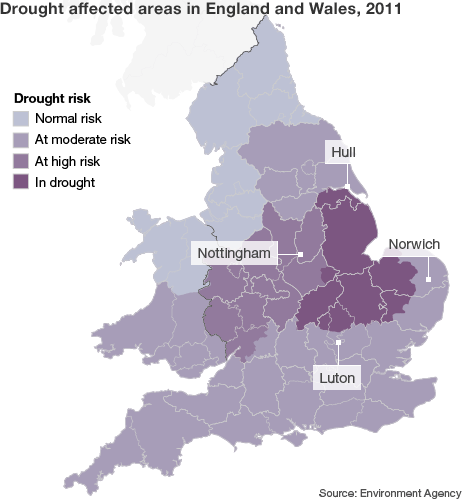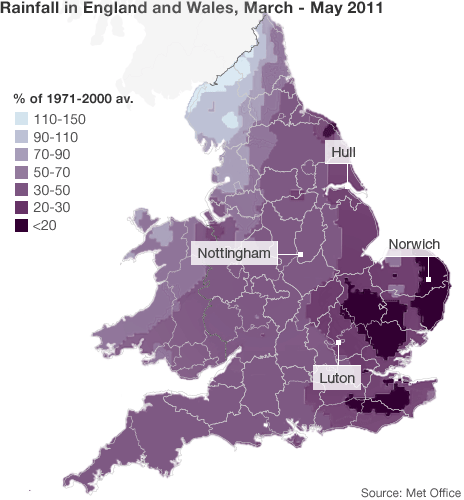Farmers and government hold drought talks in England
- Published
Farmers, environmental groups and water companies have been holding talks with the government to discuss the drought declared in eastern England.
East Anglia has been worst hit - but near-drought conditions have also been reported in the Midlands, Wales, the south-east and south-west.
Anglian Water and Cambridge Water say there is no threat to public supplies but told farmers to reduce pumping.
The government is under pressure to adopt a more strategic approach.
It is due to outline its proposals in a White Paper later this year.
The environmental group, Friends of the Earth, has called on ministers to introduce tougher water efficiency standards for businesses and homes, and stricter planning controls on housing developments.
So far none of the water companies has introduced a hosepipe ban, but Severn Trent customers in Staffordshire, Nottinghamshire, Derbyshire and Leicestershire have been warned restrictions could be introduced in the coming months.
Food price warning
Environment Secretary Caroline Spelman has held a second drought summit to review the impacts of the continuing dry weather.
She said: "Everyone who has a licence to abstract water, or remove it from rivers, has their own conditions.
"But you might not need it. You might be growing something where you didn't need it in which it is possible to swap, perhaps, with a neighbour or another farmer who did need it. And the Environment Agency are now going to look at ways to facilitate this and make it more transparent."

Wheat struggles to grow in parched earth near Halstead, Essex
Earlier, the Department for Environment, Food and Rural Affairs (Defra) said parts of the Midlands, South West and South East were in a "near-drought" state.
Thames Water, which serves London and the Thames Valley, has reassured its customers hosepipe bans are unlikely this year.
Both the South East and central-southern regions of England have had their driest spring on record.
Across England and Wales as a whole it has been the driest spring since 1990, prompting the Environment Agency to issue advice on how best to reduce water use., external
It comes as large areas of northern Europe are facing drought after one of the driest European springs on record.
But not all areas of the UK have suffered from the dry weather. Scotland has had 20% more rain than usual for spring, while snow flurries were reported on Friday at the summit of Mount Snowdon in north Wales.
Low levels of water are causing considerable problems for farmers, with crop yields being hit.
And the British Retail Consortium said the dry weather had created "another unwelcome upward pressure on food prices".
A Defra spokesman said: "We are working closely with farmers, growers and their organisations as they manage and adapt, not just to the current drought but also to become more resilient in the longer term.
"Although drought has now been declared in some parts of the country, it's too soon to predict what the final impact on crops will be.
"Since agricultural commodity prices are determined on the international markets, global weather conditions will have a far greater impact on crop prices - and ultimately the food in our shops - than the UK drought alone."


- Published8 June 2011
- Published19 May 2011